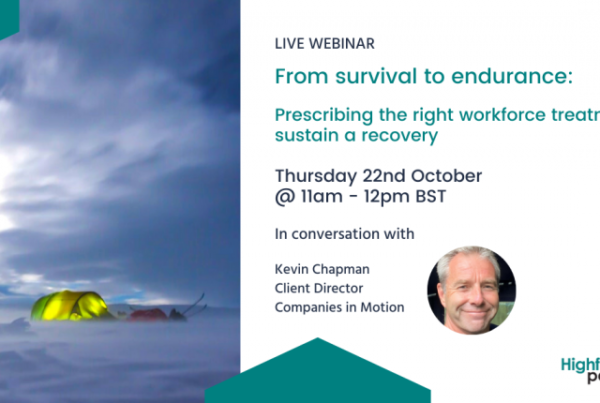Recruitment firms and employers alike often stress the importance of providing a positive candidate experience, but having heard so many negative anecdotes, we were prompted to research the subject. We recently surveyed Management to Director level HR professionals who had experienced life as a ‘candidate’ over the last two years, to find out how their experience had been. We explored how they commonly entered a recruitment process, what their experiences had been (good and bad), distinctions between engaging directly with employers and third parties, and invited recommendations for improvements. Our key findings are discussed below.
Is the ‘candidate experience’ important?
Much noise is made by employers around securing the best talent, using employer brand to attract the highest performers, and by recruitment firms promoting their first class customer service. Newsflash: 57% of Management to Director level HR professionals we surveyed felt their candidate experience was worse than they’d expected’ – so do employers and recruiters really care about this as much as is claimed? Does it only really hit home that you could have given a better candidate experience when you’ve lost them to another employer after months of searching? With just 14% saying they’d had a better than expected experience, is HR just a tough crowd to please, or a group with expertise in this arena that should be listened to? Ultimately there will be fundamental factors that must attract anyone to a role or company, but at the margins of decision-making the level of emotional engagement that the employer has managed to achieve that will probably make the difference if choices have to be made. What’s more, writing as someone who works in search, this principle will also be true of encouraging someone to leave a company that they’re perfectly happy with – so the candidate experience can be telling.
Where does the experience begin?
For vast majority the typical candidate experience starts as an application to an advert – 71% (43% to third party recruitment firms/28% directly to a company advert). They say first impressions are important, so failing to acknowledge the application doesn’t start things off well, but comments in the survey suggest this practise was common enough, more so with recruitment firms. This combined with failing to respond with feedback on their application accounted for nearly 60% of comments on the most common negatives experiences directly with the employer (the figure was similar with recruitment firms too). Given nearly 50% of people in the market had over 10 applications in the last 2 years, and 35% had over 20, surely an appreciation of the investment of time people put in to a career search should merit some basis courtesies.
It was a little surprising in the age of in-house talent acquisition or resourcing teams, that only 6% of people were approached directly by an employer, whereas 3 times that number were headhunted to a recruitment process by third parties – so headhunting still seems to be the domain of the third party. Referrals from a personal contact accounted for 7% of routes of entry to a recruitment process. Interestingly enough, most negative comments on a candidate experience seemed to stem from responses to adverts and the frustration that ensues from insufficient communication thereafter, where the alternative routes seem to bring more positive candidate experiences in feeling closer and better informed on the process.
Recruitment Firms – Beware!
Our survey shows the ratio of candidates entering a recruitment process is 60/40 through a recruitment firm rather than directly with the employer. Asked whether candidates rated their experience better or worse when dealing with an employer directly, 44% said better, less than half that figure said worse. Reasons supporting this indicated better and fuller ongoing communication, provision of better information, feeling closer to the process, greater concern for the company brand, a clearer view on your suitability. Conversely, some common negative experiences of recruitment firms included failure to offer credible feedback on decisions not to progress, not providing sufficient detail/not having sufficient understanding of the role, and perceived failings to push back to their clients enough on role requirements or feedback.
This is a problem recruitment firms need to address you may think, and yes it’s a vital, yet still recurring problem in the industry – too many fail to make the connection, that providing a quality candidate experience today (whilst a little more time consuming) will bring a quality client relationship tomorrow. Dodging, blagging, ignoring – candidates know what’s going on! However, employers need to pay attention too, as it’s their employer brand that may also get tarnished by association, and they are also in a position to make demands of their suppliers. Like retailers with factory outlets in cheaper labour markets, companies do hold sway to make sure their suppliers deliver in a way that’s a credit to both.
Communication, Communication, Communication
The central findings of the survey may not come as a radical surprise to most, but if nothing else they reinforce the premise that the candidate experience is not actually that difficult to improve, with some fundamental attention to the basics of good communication. 77% rated communication as the most important factor to a quality candidate experience, and over 50% suggested it was the one key thing that companies could do better. With 60% of the common negative experiences relating to lack of communication at the early stage of the process, this should be uncomplicated enough for most to rectify. When asked to recount any particularly outstanding candidate experiences they’d had, far from any all singing all dancing recruitment process examples being heralded, it was prompt, continuous and personal communication that featured most highly. Indeed lack of communication was one of the highest scoring answers that would encourage someone never to work with or for that company, with top being lack of courtesy/unprofessionalism. Other high scores came with being unimpressed by the people you met, a cumbersome applications process, a disorganised process and meaningless feedback. It is highly likely that the fewer links in the communication chain the better it will be, as those in it will be more accountable – a candidate talking to a recruitment firm, talking to a RPO, talking to a HRBP, talking to the hiring manager isn’t a recipe for a clear, timely, detailed flow of information I suspect!
5 simple rules to provide a manageable and positive candidate experience:
• Communicate with candidates promptly at each stage of the process, proactively once in the process, decisively at the end of their process, and where possible making it personal (a call or personal email rather than standard response – especially once at interview stage)
• Treat candidates with courtesy & respect: it starts with a simple acknowledgement, giving responses and information when requested, not mucking them around at interviews and leaving them dangling with no news for an eternity (with no explanation)!
• Be informative: Ensure the candidate is able to prepare thoroughly with the provision of a detailed brief, relevant company and background information (careers sites can be great forums), set realistic expectations on timelines, provide detailed and relevant feedback where possible.
• Create a selection process that is rigorous but objective, efficient, assesses criteria relevant to the role
• Chose the interview panel well – stakeholders with relevance to the appointment, people who know how to interview, will present the opportunity favourably and realistically, ensure decision makers collaborate
• …..and a point for luck – employers are in a position to make sure their suppliers are delivering a strong candidate experience, and should ask candidates how the service has been. Their brand is in the hands of their suppliers, and if it’s failing to be represented as they’d like, they should take the supplier to task. .
To coin a well-used phrase, recruitment isn’t rocket science (unless you’re an occupational psychologist!) so if you get the basics right, make someone feel valued, or even avoid making them feel de-valued, you should be on the right lines. After this use all the bells and whistles as you like- I’m sure it’ll be appreciated too.
If you’d like to receive a copy of our survey results or discuss any of its findings, please feel free to get in touch.
Some light reading
……here are some examples of comments we received in response to questions on the experiences with employers directly, with recruitment firms, what was most commonly failing and what stood out as good practise.
‘Gone are the days where an agency treats you as a customer. It is rare for an agency to call back or respond to an application’
‘One agency had disregarded my application on the basis that I had no degree, as they did not recognise my response to their question regarding ‘highest qualification’. I had a PhD and they believed this equated to an NVQ!’
‘It is clear that you are ‘one of many’ and so the recruiter’s focus is more towards the client than the candidate, so you are treated with little respect – you are merely a pawn in their game.’
‘Varies on Company but a lot don’t actually know what they want and the process takes about 3 months+, no one seems willing to actually make a decision’
‘I found it hard to deal with recruitment agencies. Most of them insist on you registering with them but after that don’t bother to keep in touch or tell you about relevant jobs. They say they have put you forward for roles, but then you never get any feedback after that. I found many of them to be quite unprofessional. There were a few recruitment consultants who were exceptionally good at keeping in touch and ensuring that you are kept updated of the process. Engaging directly with the employer was always better’
‘the majority of companies using web based application processes have not even bothered to respond at all. I now apply expecting to hear nothing.’
‘I believe lack of courtesy for applicants is indicative of the HR team not understanding the link between employer brand and customer brand – I may well be an existing or potential customer but my experiences will put me off those companies as a customer as well as an employee.’
‘The single most influential factor for me is the quality of people participating in the selection process. These are likely to be the people you will work for or with and do not always realise how important the impression they create is when making a decision on accepting a role’
‘Just good manners – reply to those who bother to apply to you. Don’t ignore them- it’s incredibly rude and arrogant’
‘Clear JD and person spec so that you could evidence how you met the criteria; acknowledgement of application; clear interview details and feedback after interview’
‘Personal approach – one to one conversations’
‘When a third party meets with you (Skype or face2face), once is enough, and take the time to get to know you, what you’ve done, what you want to be doing, what makes you tick, who you want to work with… and respect all of that in their search. It means they may call you less but when they do, it is relevant. The relationship becomes a partnership, it is being built for the long term and as a candidate you feel like you choose to work with them. It also gives the will to support that third party in their endeavours which might not be related to you directly. A third party who is willing to support a candidate even though they are not involved in a particular recruitment process is a third party who understands what business is all about. I have been lucky to come across a handful of these.’
‘I got to the second and final stage of interviews for one of the big companies. The whole process was very clear to me, communication was excellent through the process and people that manage my recruitment were very nice and approachable. After the second interview I also received in depth feedback. Job well done for them (not so much for me as I did not get the job).’
‘The company went the extra mile to make it a seamless process. Regular communication, lots of engagement and clear evidence of really thinking through the onboarding process’
‘Profile assessment was done with feedback on the strengths of the profile and how it would (or would not) support the role. Feedback on candidacy strengths and gaps / why the profile did not/would not fit. Transparency and candour.’
‘There is no substitute for the personal touch. A telephone call rather than an e-mail. A personal letter rather than a standard letter etc.’
‘Being treated as though they are doing you a favour by interviewing you and being inflexible over interview times/notice for interviews and location for interviews – commonly not respectful of your time and your own work pressures’
‘No response at all to applications. If companies are not resourced to deal with the response they should reconsider their process. Also I have experienced several companies who put no salary range on their adverts but expect you to enter your expectations into their automated process – this makes me feel like I am bidding for the job. I followed up with one large telecoms employer who told me that my expectations were too high – I told them that if they had given an indication of the level of the role I would have saved myself the time applying for it. Asking a candidate to guess what the role will pay is not good practice. Their response was that they cannot put salary ranges as they do not want their existing employees to know what they are offering Equally, automated processes rarely give a contact and applicants are totally without any way into the company.’
‘Navigating a maze – no contact person’
‘The recruiter not knowing my CV (one even called me by someone else’s name).’
‘Large agencies – constantly phoning about very inappropriate roles , sending impersonal emails every month asking whether my circumstances have changed, not phoning when roles actually do match my requirements, not knowing enough about the roles they are trying to fill, knowing little about HR.’
‘You can never ring a third party who is not either on the phone, in a meeting, or just popped out of the office but will “call you back”!!!!!!!’




